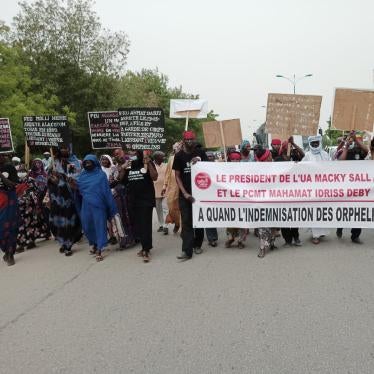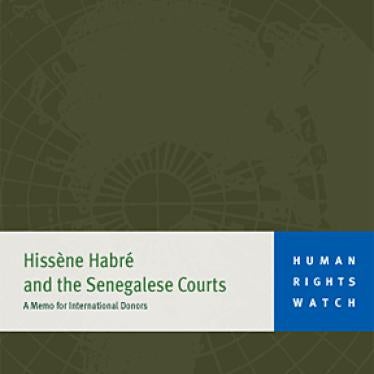(New York) - One of Chad’s “most feared torturers,” was recalled this week from the United Nations Operation in Côte d’Ivoire (ONUCI) after a complaint to the UN by Human Rights Watch, said Reed Brody, the group’s special counsel. Mahamat Djibrine had been working in ONUCI’s civilian police contingent until the government of Chad withdrew him.
Under the abusive one-party government of Hissène Habré (1982-1990), Mahamat Djibrine was one of the key directors of the Documentation and Security Directorate (DDS), Habré's principal instrument of repression.
According to an official Truth Commission report, Mahamat Djibrine was one of the “most feared torturers” (tortionnaires les plus redoutés) in Hissène Habré’s Chad. The Truth Commission found that Mahamat Djibrine was part of a five-member committee of the DDS charged with the interrogation of detainees. In the words of the Commission: “the committee systematically made use of torture during its interrogations.” The Truth Commission reported that Djibrine was also part of the committee formed by Habré to arrest members of the Hadjeraï ethnic group during the pogrom against that group in 1987, and a similar committee to arrest ethnic Zaghawas in 1989.
Before being sent to Côte d’Ivoire, where he was involved in the UN’s investigation of human rights cases, Djibrine was Chief of Staff of the Director-General of the Chadian National Police. Djibrine is one of some 30 leading Habré-era figures, many accused of torture and killings, who still hold key posts in the Chadian security apparatus, despite the Truth Commission’s recommendation that they be removed and prosecuted.
“For the Chadian government to send a reputed torturer like Djibrine to the United Nations was an insult to his victims and to the people of the Ivory Coast the UN is supposed to assist,” said Jacqueline Moudeina, president of the Chadian Association for the Promotion and Defense of Human Rights (ATPDH). “Unfortunately, it is symptomatic of the Chadian government’s complacency towards Habré’s henchmen, many of whom are still in positions of power.”
Djibrine is accused in several criminal complaints filed in Chadian courts by victims who allege that he directly participated in their torture. One complaint, filed by Ismael Hachim, now president of the Chadian Association of Victims of Political Repression and Crime, and who was brutally tortured in detention, alleges that Mahamat Djibrine threatened him with a revolver during his imprisonment.
The university professor Zakaria Fadoul Khidir, a Zaghawa who was arrested during the 1989 pogrom, later wrote that when he protested that he was not involved in opposition activity, his interrogator, Mahamat Djibrine, replied, “Monsieur le Professeur, responsibility is collective.”
The role of Mahamat Djibrine in Hissène Habré’s repressive apparatus is amply supported by the official records of the DDS uncovered by Human Rights Watch in N’Djaména in 2001. In addition, Human Rights Watch and the International Federation of Human Rights Leagues have collected the testimony of nine victims who allege that Mahamat Djibrine participated in or was present during their torture. Several of these victims allege that they were subjected to the so-called arbatachar, in which a prisoner’s four limbs were tied together behind his back, leading to loss of circulation and paralysis.
Background - The Case Against Hissène Habré, an “African Pinochet”
A Belgian judge is continuing his probe after an historic mission to Chad to investigate atrocity charges against Chad’s former president, Hissène Habré. Habré lives in exile in Senegal, where he was indicted five years ago on charges of torture and crimes against humanity before the Senegalese courts ruled that he could not be tried there. Habré’s victims are now seeking his extradition to stand trial in Belgium, and Senegal has agreed to hold him pending an extradition request. The case was not affected by the repeal of Belgium’s “universal jurisdiction” law. In the meantime, the case has opened new possibilities for justice for Habré's victims in Chad itself.






